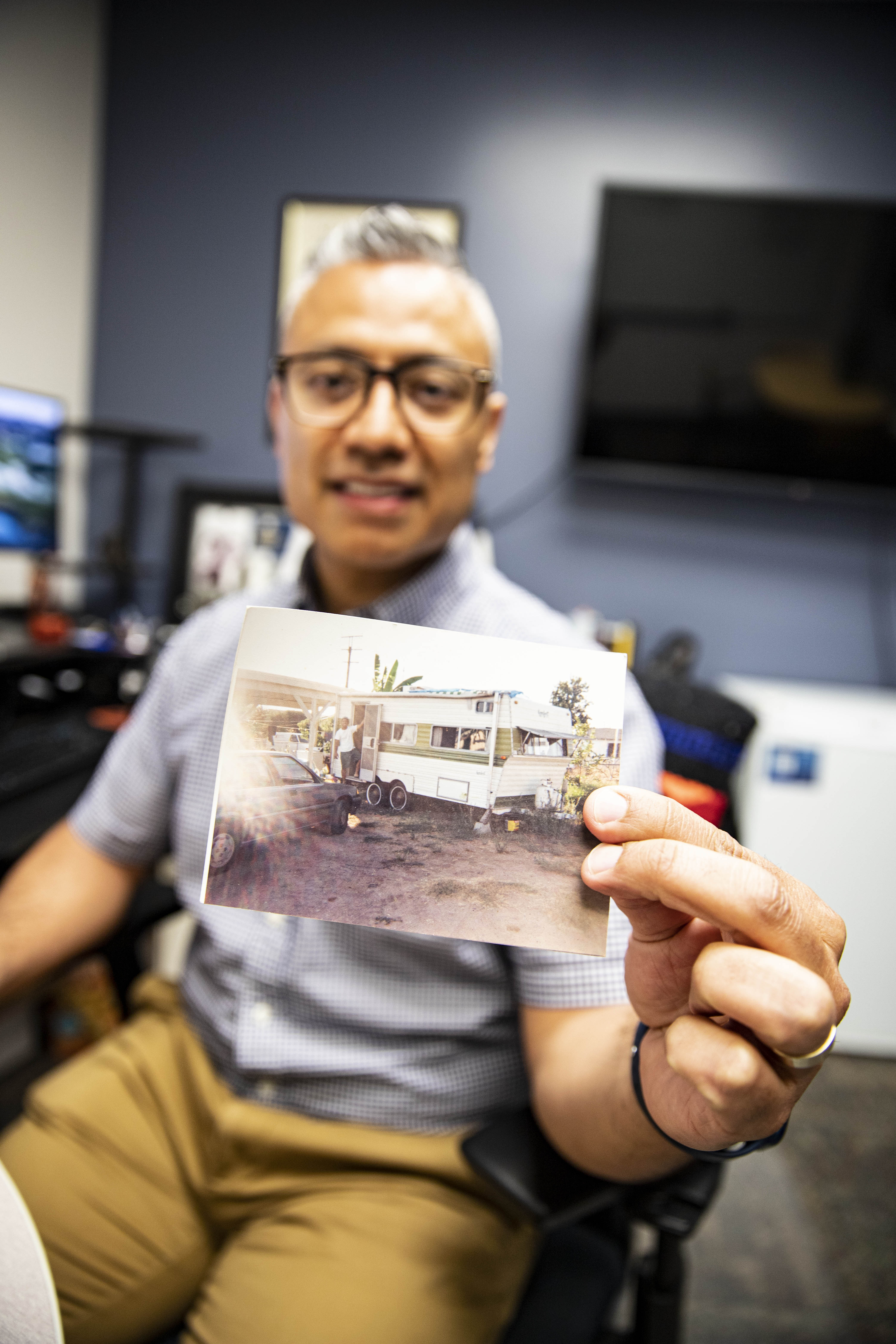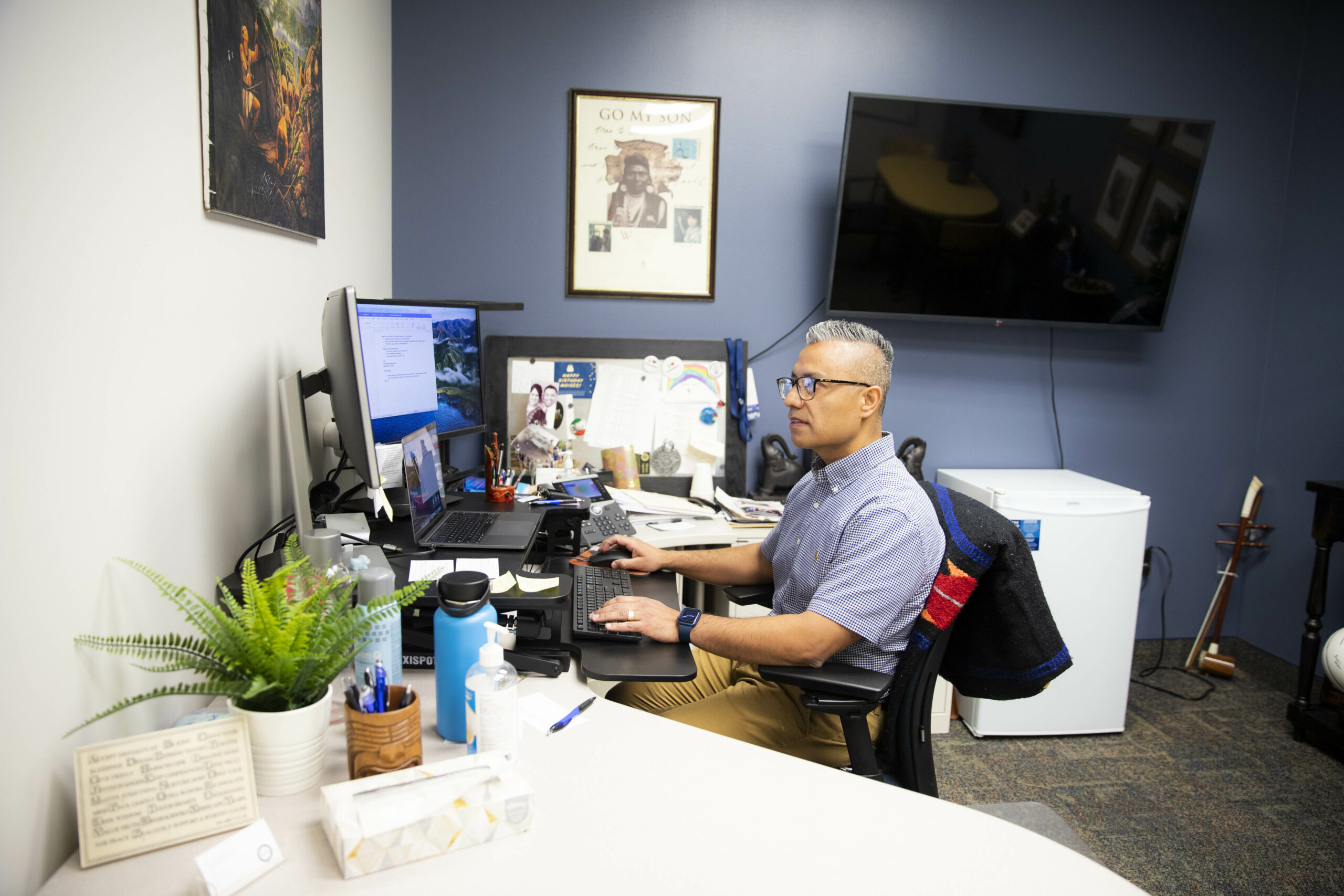Editor’s note: This story appeared in the April 2022 edition of The Daily Universe Magazine. Questions and answers have been lightly edited for clarity and space.
Moises Aguirre is the director of the Multicultural Student Services office. He shares how his childhood and experiences at BYU have increased his faith in God.
Q: Can you please tell me about yourself?
A: I am from Tijuana, Mexico. I am the youngest of eight children and I was raised in the Church by really great parents. I grew up doing a lot of the traditional Mexican dances and playing volleyball and basketball for my school teams.
I had a great, very unique childhood. Tijuana is overpopulated and difficult. I was raised in a humble, low socioeconomic home. None of my siblings went to high school or college; I was the only one who was interested in pursuing my education.
Growing up, my dad was able to work in the United States and he would go work in Los Angeles for a couple of months and then come home to provide money for our family. One Saturday night, my dad came and told us we would be moving to California the next day. We moved to San Diego and it was pretty scary.
Some sisters from the Relief Society helped get me registered for high school and I was determined to learn English and get my education. A couple months later, my parents decided to go back to Tijuana due to my dad’s declining health. I told my parents that I would not go back to Mexico with them.
I told them “I’m going to stay and get my education.” I’m very thankful my parents were so strong and allowed me to stay on my own. They went back and I lived in a little trailer in the backyard of a member’s home. We rented that trailer for the next three years while I got my education and I did really well in high school.
Soon after I graduated, I went on my mission to Cincinnati, Ohio and Kentucky — I was the first Spanish speaking missionary to serve there. I didn’t know anything about BYU until a kind branch president told me I needed to apply and go to BYU. Being a first generation student, I hadn’t even really thought about college. He got me a paper copy of the admissions application, helped me fill it out and we sent it off.
Once I came home, I visited Utah and found out I’d been accepted. I completed both my bachelor’s and master’s degrees at BYU and I’ve been working at BYU for almost 10 years. I love working with multicultural, underrepresented students and creating resources and opportunities for them to be successful.
Overseeing the work we do with the multicultural students truly has been a humbling experience for me. Being able to validate and honor students’ stories, help them navigate intimidating things and help them change the course of their lives is so rewarding.
Q: How does your faith strengthen your connection to your Mexican heritage and culture?
A: I feel like they are interrelated. My culture is very important to me and my connection to my ancestors has truly prepared me to overcome many challenges. I’m very grateful for those who came before me and for the path they prepared for me to move forward with my goals and get an education.
I come from very faithful spiritual parents who have been an amazing example. My culture has been a way for me to feel the Spirit and a way for me to see the hand of the Lord in many ways. I grew up dancing the traditional folklorico dances since I was six years old and I remember being able to perform and being able to share my testimony through those dances. I just feel very thankful for how my culture has allowed me to strengthen my spirituality.
Since I was a kid I knew that I was special to Heavenly Father and I knew He loved me. Being able to celebrate different aspects of my culture has really allowed me to know that He loves me for who I am and what I represent.
When Christ came to the Americas and visited those people, I’ve always felt a connection because those are my people, my ancestors. When I read the Book of Mormon, I can feel the power of my people and I’m just grateful for their Christlike attributes such as humility, hard work and kindness.
Q: How has your faith and religion guided you in times of struggle as you worked to become an accomplished, professional educator and advisor?
A: As a first generation college student, faith has been the biggest motivator, power and reason for me to continue. When I lived on my own to get my high school education at 15, it was a very hard experience.
Not having a family member nearby to rely on when I got sick or something was hard. I learned to rely on my Heavenly Father. I remember when I would struggle, I would kneel down and ask Him for the strength that I needed. I remember opening my scriptures in the morning and reading verses that spoke directly to my circumstance.
I played basketball and volleyball and I got the MVP award every year. I remember, if I got a plaque or a trophy, going back to my little trailer and not having anyone to share it with. During the ceremonies where they would recognize us and give out the trophies, all my friends had their families and were given balloons. And I was just by myself.
I remember many times kneeling down and pleading, “Father, allow me to feel your love and let me know you are aware of me. Let me know that all of this sacrifice is going to be worth it and is for a reason.”
Many times, I felt something real embracing me and making me feel that He was there and He was aware. My faith allowed me to know God knew this huge sacrifice was going to change the chain of poverty and lack of opportunities for my future generations. I waited 22 years to receive my documents. All those years going through high school, going on my mission, coming back, coming to BYU, I didn’t have my documents. So it was very difficult to financially support myself and my parents didn’t have the money to help me.
But I’ll tell you, I was able to rely on the Lord as I worked really hard and put my faith in Him. Nothing is impossible for Him. As the director of the Multicutlural Student Services office, I often kneel in my office and ask Heavenly Father to guide me on what services we need to provide and how to let students know they are not alone in this journey.
I’ve had students come and even ask me for a blessing. To be in an institution where we can utilize the principles of the gospel, the power of the priesthood and the power of the Holy Ghost is such a blessing. Through our faith and commitment to the gospel, we can overcome anything and the Lord can truly manifest Himself to let us know when we’re doing the right thing.
Q: How has being an administrator at BYU impacted your faith?
A: As an administrator, I often pray and fast to know what the Lord wants us to do in the MSS office. I work with a unique team of multicultural advisors who are so invested in the success of their students. Every Monday at 10 a.m., we come together in prayer to identify how we can better serve our students, what are some of the challenges they are facing and how we can foster unity.
I’ll be honest, becoming an administrator has become an added opportunity for me to rely on my Heavenly Father and to put my faith in action. We are living in difficult times and there are different things that can shake the students’ faith and sense of belonging.
In our office, we’re often praying how we can mitigate those challenges, how we can let our students know we are here for them and will advocate for them and walk with them. The advisors here will understand in different ways what it is to be a minority and what it is to have certain challenges. Everyone is so committed to letting students know they’re cared for because we truly do love them.
Q: What are some things people at BYU could do to better understand the experiences of minority students on campus?
A: I would encourage everyone to take the time to learn each other’s stories. There are a lot of emotions that come to me because that’s one of the most sacred things that we can do: learning somebody else’s story. When we intentionally make time to listen to someone else’s story, our love and understanding grows for that person.
I’m very privileged to have many students come to my office and share who they are and their success and struggles. They share where they come from, their heritage and their culture. When I have one of those encounters, I feel like the most enriched individual in that moment and I just want to be better. Sometimes I even have to stop myself from talking with them because they need to go to class.
To be honest, if we all would take the time to learn about our neighbors’ stories or our students’ stories or our colleagues’ stories, we would be better people. The more we learn more about our students and where they come from, the better we will know how to approach them and how to validate another person’s experience. It will make us more understanding, patient and loving so we can become a Zion-like community.
Q: What has been the most rewarding part of being a member of the Committee on Race, Equity and Belonging?
A: Learning of the students’ stories. We had the opportunity to have one-on-one visits with different students and invited them to share their experiences as a person of color at BYU. We also had opportunities to host focus groups where more people shared their stories. We also visited with a good number of faculty, staff and alumni who were all willing to share their experiences of being people of color at BYU.
For many of them, if not all, being so vulnerable may have felt scary. It’s not easy to be vulnerable. We had the opportunity to honor their experiences, to validate and respect those experiences and not try to justify anything. We just thanked them for their willingness to share. I was so humbled to be part of that, I felt I gained a support system that was so amazing.
The meetings we had with President Worthen were amazing and so enlightening. He is an amazing person and it’s so obvious to me that he cares so much for every student. It’s been amazing to see so many people who are so committed to the wellbeing of our students and who want to create a better environment for our students of color.








